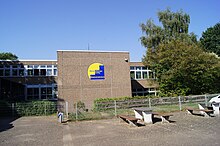Further education college Westmünsterland
| Further education college Westmünsterland Bocholt and Borken |
|
|---|---|
| type of school | Further education college |
| founding | 2008 |
| address |
Paul-Schneider-Weg 3 |
| place | Bocholt (West Munsterland) |
| country | North Rhine-Westphalia |
| Country | Germany |
| Coordinates | 51 ° 50 ′ 37 " N , 6 ° 37 ′ 6" E |
| carrier | City of Bocholt |
| student | about 300 |
| management | Alexandra Hunter |
| Website |
www.abendgymnasium.bocholt.de www.abendrealschule.bocholt.de |
The training College Westmünsterland is a device of the second path formation in order to obtain various degrees ( High , High school , college entrance and university ).
The school authority is the city of Bocholt . Another school location is in the Remigianum school center in the district town of Borken , the costs of which are settled by the town of Borken with the school authority. In Bocholt lessons are offered in the morning and in the evening, in Borken only in the evening. Visiting the school is free for students.
organization

The further education college Westmünsterland was founded in 2008 by merging the evening secondary school Bocholt-Borken and the evening high school Borken-Bocholt. With 16 teachers and around 300 students, it is one of the smaller colleges in Germany, but has a large catchment area in the rural region. As of August 30, 2017, a "Kolleg" department with longer teaching times and a larger selection of subjects will be offered.
The school is usually two years in the Department Abendrealschule to High school and two years in the Department of night school to technical college , three years until high school . It is calculated in semesters, i.e. four or six semesters. The courses end with the central final examination for the middle school leaving certificate or the central high school diploma. The advanced technical college entrance qualification is awarded without an examination and enables study at the universities of applied sciences.
The subjects are taught:
|
|
entry requirements
The advanced training college accepts students who have finished their compulsory schooling . The minimum age of the students in both departments is 18 years. In addition, periods of professional activity must be proven, including minor employment or activities such as caring for relatives or housekeeping. There are no further restrictions for evening secondary school, depending on qualifications and previous school-leaving qualifications, interested parties will be admitted to the preliminary course or a higher semester.
For admission to the evening grammar school, a middle school certificate - even without a qualification note - and at least two years of professional activity are required. Times of training, military or community service, unemployment, running a household, caring for a relative and long-term internships are also taken into account.
The only exception to these requirements applies to graduates of the Abendrealschule who can continue their school education at the Abendgymnasium once they have reached the technical college entrance qualification. However, they have to leave the advanced training college with the advanced technical college entrance qualification (school part) if they do not meet the other requirements. A counseling interview is mandatory before registration.
history
As one of the first evening secondary schools in North Rhine-Westphalia, the ARS of the city of Bocholt began its work on April 22, 1963. The direct forerunners of the evening secondary schools were the evening grammar schools, which soon after the end of the Second World War gave adults whose school careers had been interrupted by the chaos of war the opportunity to catch up on their Abitur. In 1963 the immediate effects of the war had been overcome, but there was still a lot of catching up to do, especially in the education sector. Of the 51 students who enrolled at the newly founded evening school in 1963, 17 held out until 1966 and obtained their technical qualification. Today the students are on average younger and have different needs and interests than in 1963.
When it was founded, the evening secondary school was located in the rooms of the secondary school in Bocholt, today's Albert Schweitzer secondary school; since 1991, it has had its own building in the former Langenberg school, which still houses the rooms of the advanced training college. In 1989 the offer was expanded to include morning courses, in 1991 the first semesters were set up in the rooms of the Remigianum in Borken used by the evening high school.
At that time there was already close cooperation between the evening secondary school and the evening grammar school. On August 1, 2008, both schools were united under the name of Weiterbildungskolleg Westmünsterland, with the Borken-Bocholt evening grammar school being formally closed on July 31, 2008.
Web links
- Abendgymnasium.bocholt.de - official website
- Official Journal of the Münster District Government with an agreement on the continuation of the Westmünsterland Further Education College (PDF file; 805 kB)
- Training and examination regulations of the advanced training colleges (PDF file; 234 kB)
Individual evidence
- ↑ 1 19 - 11 No. 1.1 Ordinance on training and examinations in the training courses of the advanced training college (training and examination regulations for advanced training - APO-WbK) ( Memento of May 9, 2009 in the Internet Archive ) (PDF; 500 kB) APOWBK § 3
- ↑ http://www.bezreg-muenster.nrw.de/startseite/Bekanntmachungen_alt/Amtliche_Bekanntmachungen/jahr_2008/PDF_Amtsblatt_2008/Amtsblatt_Nr_13.pdf (link not available)
